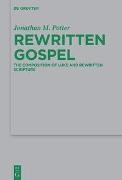Read more
How early Christian gospels were written is an old question that continues to engage scholars. Moving beyond the traditional approach of reading Luke as a "gentile" gospel composed primarily using Greco-Roman methods of history and biography writing, this book argues that Luke's use of the earlier Gospel of Mark should be understood in the context of contemporaneous early Jewish writings known as "Rewritten Scripture." Texts like the Book of Jubilees and Josephus's Antiquities interpret Scripture by rewriting it in such a way that ambiguities and contradictions are diminished, while also adapting it to contemporary beliefs and practices. A similar strategy of interpretation through rewriting best explains Luke's reworking of Mark. Even if Mark is not yet "Scripture," Luke's manner of rewriting Mark suggests that Luke views the earliest gospel as an authoritative narrative about Jesus that merits interpretive clarification and expansion rather than rejection or critique. This approach offers solutions to various "problems" in the composition of Luke, such as the combination of expansion and omission, verbatim repetition and free paraphrase, and it also places Luke's compositional process within a plausible ancient literary context.
About the author
Jonathan Potter
, Emory University, Atlanta, USA.
Summary
How early Christian gospels were written is an old question that continues to engage scholars. Moving beyond the traditional approach of reading Luke as a "gentile" gospel composed primarily using Greco-Roman methods of history and biography writing, this book argues that Luke’s use of the earlier Gospel of Mark should be understood in the context of contemporaneous early Jewish writings known as "Rewritten Scripture." Texts like the Book of Jubilees and Josephus’s
Antiquities
interpret Scripture by rewriting it in such a way that ambiguities and contradictions are diminished, while also adapting it to contemporary beliefs and practices. A similar strategy of interpretation through rewriting best explains Luke’s reworking of Mark. Even if Mark is not yet "Scripture," Luke’s manner of rewriting Mark suggests that Luke views the earliest gospel as an authoritative narrative about Jesus that merits interpretive clarification and expansion rather than rejection or critique. This approach offers solutions to various "problems" in the composition of Luke, such as the combination of expansion and omission, verbatim repetition and free paraphrase, and it also places Luke’s compositional process within a plausible ancient literary context.

